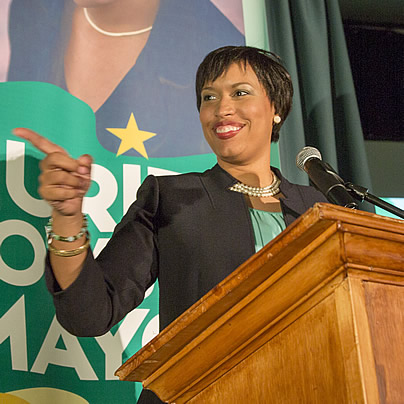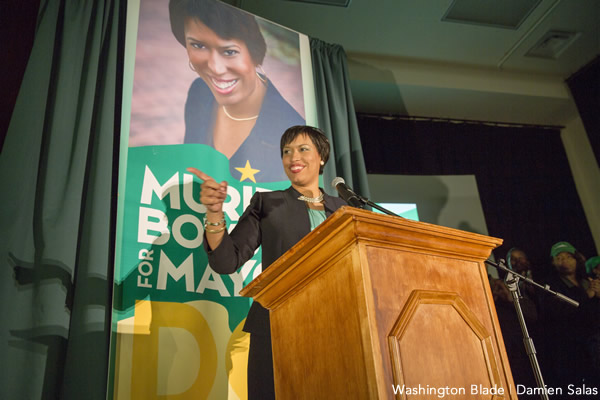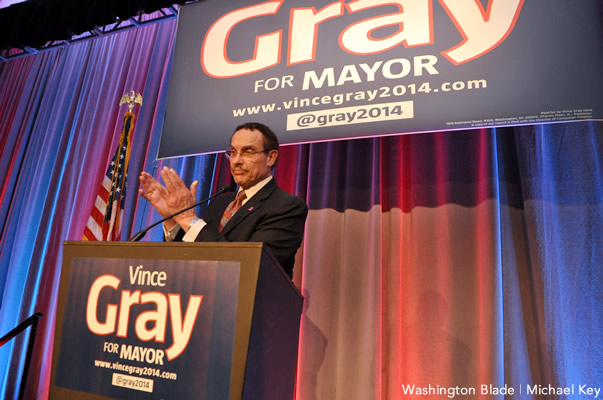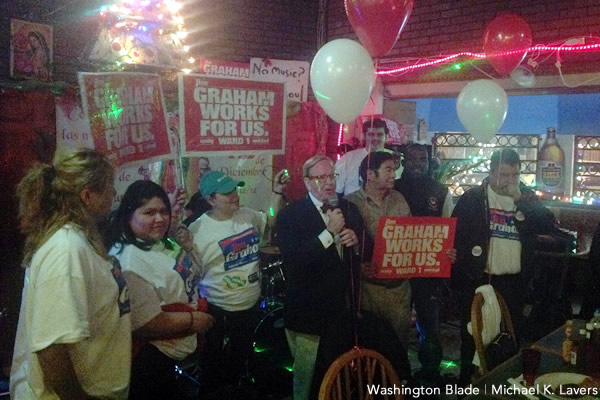Local
BOWSER TOPPLES GRAY
Graham loses; prospect of no gay representation on Council


Council member Muriel Bowser defeated Mayor Vince Gray, setting up a contest with gay Council member David Catania in November. (Washington Blade photo by Damien Salas)
D.C. Council member Muriel Bowser (D-Ward 4) won 13 out of 16 precincts believed to have high concentrations of LGBT residents in her victory over Mayor Vincent Gray and six other candidates in the city’s Democratic primary on Tuesday.
In final but unofficial returns released by the Board of Elections and Ethics, Bowser had 44 percent of the vote compared to 32 percent for Gray in one of the city’s lowest turnout elections.
Bowser’s decisive win created deep disappointment among the large number of LGBT activists supporting Gray, many of whom consider him the nation’s most LGBT supportive mayor. His initiatives on transgender equality earned him strong and loyal support from the transgender community.
Although Bowser had a strong showing in voter precincts with high concentrations of LGBT residents, some activists backing Gray said they would take a careful look at gay Council member David Catania (I-At-Large), who will be running against Bowser as an independent candidate in the November general election.
“I am still proud of our mayor, Vince Gray,” said gay Democratic activist Lane Hudson, who co-founded Gray Pride, an LGBT group that campaigned for Gray.
“I will be listening very carefully to what Muriel Bowser says and does to bring our party together and also curious of the tone and approach that David Catania brings to this race,” Hudson told the Blade.
Transgender activist Jeri Hughes, along with Hudson, were among the many LGBT supporters that attended Gray’s election night gathering at the Hyatt Regency Hotel on Capitol Hill.
Like many Gray supporters, Hughes blamed Gray’s defeat on the decision by U.S. Attorney Ronald Machen to publicly disclose two weeks before the election that businessman Jeffrey Thompson implicated Gray in a scheme to raise more than $500,000 in illegal funds for Gray’s 2010 election campaign. Gray has long denied having any knowledge of the scheme, which the U.S. Attorney’s office has been investigating for four years.
“My thinking is that Ron Machen should be forced out of D.C.,” Hughes said following Gray’s concession speech. “His innuendo affected the outcome of this election, and the District of Columbia is going to have to pay for it,” she said.

Mayor Vincent Gray lost his bid for re-election, weeks after the U.S. Attorney implicated him in a scheme to raise illegal funds for his last race. (Washington Blade photo by Michael Key)
“Vincent Gray did an excellent job as the mayor,” Hughes said. “And it’s a sad thing that innuendo can influence an election to where someone who has done an excellent job can lose in the last stages of his campaign.”
In what political observers are calling one of the biggest upsets in this year’s City Council elections, gay four-term Council member Jim Graham (D-Ward 1) lost his re-election bid to political newcomer Brianne Nadeau, a civic activist and vice president of a local public relations firm.
Final but unofficial returns reported by the Board of Elections show Nadeau received 5,755 votes, or 58.7 percent, compared to Graham, who received 4,003 votes, or 40.8 percent. Absentee and provisional ballots had yet to be counted.
Nadeau expressed strong support for LGBT rights while criticizing Graham for an ethics charge involving a Metro development contract that led to a decision by his Council colleagues to vote 11 to 2 to officially reprimand him last year.
Saying Graham’s ethics charge followed the arrest and prosecution of two other D.C. Council members on corruption-related charges, Nadeau called on voters, including LGBT voters, to elect her to send a message that political corruption is unacceptable.
Graham’s long record as a champion for LGBT rights and his work in fighting AIDS as the former executive director of the Whitman-Walker Clinic made him highly popular in the LGBT community. And his reputation as one of the Council’s strongest providers of constituent services made him highly popular among the ward’s highly diverse population groups, including Latino and African immigrants.
Most political observers in the ward believe the ethics issue was the key factor in Graham’s loss of support from many of his constituents, including LGBT residents.
Nadeau beat Graham decisively in four of six Ward 1 precincts believed to have large numbers of LGBT residents in Adams Morgan, Columbia Heights and the U Street, N.W. corridor. Graham won just one of the six precincts — Precinct 36 in Columbia Heights — by a margin of 52 percent to 48 percent.
He lost Precinct 137 in the U Street corridor by just one vote, with Nadeau receiving 125 votes to Graham’s 124 votes. Nadeau won the others by margins of greater than 10 percent.
“We did our best to represent the great diversity of this ward, bringing together people of all backgrounds in a common purpose who deserve good representation here in Ward 1,” Graham said at his election night gathering in a restaurant in Mount Pleasant.
“Let’s give all of the people who worked so hard a round of applause because we have solid support from African Americans, solid support from Latinos, solid support from the Ethiopian community, solid support from the Vietnamese and pretty solid support from people who look like me,” he said.

Gay Council member Jim Graham was defeated on Tuesday, ending a 16-year run on the Council. (Washington Blade photo by Michael K. Lavers)
In her victory speech at another restaurant at 11th and U streets, N.W., Nadeau thanked Graham for what she said were his years of service to Ward 1. But she also reiterated her campaign call for addressing ethics in government.
“Today voters embraced ethical leadership focused on making Ward 1 more affordable and improving our neighborhood schools,” she said. “Together we built a strong grassroots movement for progressive change, one that resonated far and wide with voters.”
With Nadeau and Bowser perceived as being strongly committed to LGBT rights, even though their records could not stand up to the accomplishments of Graham and Gray on those issues, many LGBT voters chose to base their vote on non-LGBT issues, according to activists following the city’s April 1 primary.
“All of the candidates are great on our issues and we are really fortunate to have an embarrassment of riches among the candidates,” said gay businessman Everett Hamilton, who is among Bowser’s leading LGBT supporters.
The six other Democratic mayoral candidates, all of whom expressed strong support for LGBT equality, finished far behind Bowser and Gray.
Council member Tommy Wells (D-Ward 6) came in third place with 13 percent of the vote. Council member Jack Evans (D-Ward 2) came in fourth with 4 percent. Busboys and Poets restaurant owner and progressive activist Andy Shallal finished fifth with 3 percent followed by Council member Vincent Orange (D-At-Large) who received 2 percent. Former State Department official Reta Lewis and businessman and singer Carlos Allen received less than 1 percent.
Similar to other D.C. residents, most LGBT voters are registered Democrats. But at least some longtime LGBT Democratic activists have said they would seriously consider backing Catania in the general election in November.
Gay Democratic activist Paul Kuntzler, a founding member of the Gertrude Stein Democratic Club, the city’s largest LGBT political group, supported Gray in the primary. In a letter he sent to Catania’s office on Wednesday, Kuntzler said he’s supporting Catania over Bowser in November.
“I believe David will make a great mayor,” he said. “I also believe he will win in November. I have voted for him every time he has been on the ballot.”
A poll released by the Washington Post in late March, however, showed that Bowser was favored by voters participating in the poll by a margin of 56 percent to 23 percent. Catania’s campaign manager, Ben Young, said the poll was conducted just two weeks after Catania declared his candidacy for mayor and after Bowser had been campaigning for more than a year.
Young, along with other Catania supporters, said Catania’s support would rise in the coming months as he steps up his campaign.
In other races, D.C. Council Chair Phil Mendelson (D-At-Large), won his primary contest by beating Democratic challenger Calvin Gurley by a margin of 81 percent to 18 percent. A series of attack ads lodged against Mendelson by the Labor Committee of the Fraternal Order of Police, which acts as the local D.C. police union, accusing Mendelson of failing to take adequate measures to fight anti-LGBT hate crimes appears to have had no impact on the election.
Incumbent Council member Anita Bonds (D-At-Large), a longtime supporter of LGBT rights, won in a six-candidate race by capturing 53 percent of the vote. Challenger Nate Bennett-Fleming, who campaign aggressively for the LGBT vote, came in second with 22 percent. Challenger John Settles received 14 percent, with Pedro Rubio and Kevin Valentine receiving 7 percent and 3 percent.
Council member Kenyan McDuffie (D-Ward 5) defeated two Democratic challengers in his primary contest by capturing 79 percent of the vote. In Ward 6, where the Council seat is being vacated by Tommy Wells, who ran for mayor, Wells’ former chief of staff, Charles Allen beat former U.S. Senate staffer Darrel Thompson by a margin of 58 percent to 42 percent.
In a hotly contested race for the city’s shadow U.S. Senate seat, incumbent Paul Strauss defeated challenger Pete Ross by a margin of 60 percent to 38 percent.
D.C. congressional Del. Eleanor Holmes Norton (D) and Council member Mary Cheh (D-Ward 3) ran unopposed in their respective races.
District of Columbia
D.C. police arrest man for burglary at gay bar Spark Social House
Suspect ID’d from images captured by Spark Social House security cameras

D.C. police on Feb. 18 arrested a 63-year-old man “of no fixed address” for allegedly stealing cash from the registers at the gay bar Spark Social House after unlawfully entering the bar at 2009 14th St., N.W., around 12:04 a.m. after it had closed for business, according to a police incident report.
“Later that day officers canvassing for the suspect located him nearby,” a separate police statement says. “63-year-old Tony Jones of no fixed address was arrested and charged with Burglary II,” the statement says.
The police incident report states that the bar’s owner, Nick Tsusaki, told police investigators that the bar’s security cameras captured the image of a man who has frequently visited the bar and was believed to be homeless.
“Once inside, the defendant was observed via the establishment’s security cameras opening the cash register, removing U.S. currency, and placing the currency into the left front pocket of his jacket,” the report says.
Tsusaki told the Washington Blade that he and Spark’s employees have allowed Jones to enter the bar many times since it opened last year to use the bathroom in a gesture of compassion knowing he was homeless. Tsusaki said he is not aware of Jones ever having purchased anything during his visits.
According to Tsusaki, Spark closed for business at around 10:30 p.m. on the night of the incident at which time an employee did not properly lock the front entrance door. He said no employees or customers were present when the security cameras show Jones entering Spark through the front door around 12:04 a.m.
Tsusaki said the security camera images show Jones had been inside Spark for about three hours on the night of the burglary and show him taking cash out of two cash registers. He took a total of $300, Tsusaki said.
When Tsusaki and Spark employees arrived at the bar later in the day and discovered the cash was missing from the registers they immediately called police, Tsusaki told the Blade. Knowing that Jones often hung out along the 2000 block of 14th Street where Spark is located, Tsusaki said he went outside to look for him and saw him across the street and pointed Jones out to police, who then placed him under arrest.
A police arrest affidavit filed in court states that at the time they arrested him police found the stolen cash inside the pocket of the jacket Jones was wearing. It says after taking him into police custody officers found a powdered substance in a Ziploc bag also in Jones’s possession that tested positive for cocaine, resulting in him being charged with cocaine possession in addition to the burglary charge.
D.C. Superior Court records show a judge ordered Jones held in preventive detention at a Feb. 19 presentment hearing. The judge then scheduled a preliminary hearing for the case on Feb. 20, the outcome of which couldn’t immediately be obtained.
District of Columbia
Judge rescinds order against activist in Capital Pride lawsuit
Darren Pasha accused of stalking organization staff, board members, volunteers

A D.C. Superior Court judge on Feb.18 agreed to rescind his earlier ruling declaring local gay activist Darren Pasha in default for failing to attend a virtual court hearing regarding an anti-stalking lawsuit brought against him by the Capital Pride Alliance, the group that organizes D.C.’s annual Pride events.
The Capital Pride lawsuit, initially filed on Oct. 27, 2025, accuses Pasha of engaging in a year-long “course of conduct” of “harassment, intimidation, threats, manipulation, and coercive behavior” targeting Capital Pride staff, board members, and volunteers.
In his own court filings without retaining an attorney, Pasha has strongly denied the stalking related allegations against him, saying “no credible or admissible evidence has been provided” to show he engaged in any wrongdoing.
Judge Robert D. Okum nevertheless on Feb. 6 approved a temporary stay-away order requiring Pasha to stay at least 100 feet away from Capital Pride’s staff, volunteers, and board members until the time of a follow-up court hearing scheduled for April 17. He reduced the stay-away distance from 200 yards as requested by Capital Pride.
In his two-page order issued on Feb. 18, Okun stated that Pasha explained that he was involved in a scooter accident in which he was injured and his phone was damaged, preventing him from joining the Feb. 6 court hearing.
“Therefore, the court finds there is a good cause for vacating the default,” Okun states in his order.
At the time he initially approved the default order at the Feb. 6 hearing that Pasha didn’t attend, Okun scheduled an April 17 ex parte proof hearing in which Capital Pride could have requested a ruling in its favor seeking a permanent anti-stalking order against Pasha.
In his Feb. 18 ruling rescinding the default order Okun changed the April 17 ex parte proof hearing to an initial scheduling conference hearing in which a decision on the outcome of the case is not likely to happen.
In addition, he agreed to consider Pasha’s call for a jury trial and gave Capital Pride 14 days to contest that request. The Capital Pride lawsuit initially called for a non-jury trial by judge.
One request by Pasha that Okum denied was a call for him to order Capital Pride to stop its staff or volunteers from posting information about the lawsuit on social media. Pasha has said the D.C.-based online blog called DC Homos, which Pasha claims is operated by someone associated with Capital Pride, has been posting articles portraying him in a negative light and subjecting him to highly negative publicity.
“The defendant has not set forth a sufficient basis for the court to restrict the plaintiff’s social media postings, and the court therefore will deny the defendant’s request in his social media praecipe,” Okun states in his order.
A praecipe is a formal written document requesting action by a court.
Pasha called the order a positive development in his favor. He said he plans to file another motion with more information about what he calls the unfair and defamatory reports about him related to the lawsuit by DC Homos, with a call for the judge to reverse his decision not to order Capital Pride to stop social media postings about the lawsuit.
Pasha points to a video interview on the LGBTQ Team Rayceen broadcast, a link to which he sent to the Washington Blade, in which DC Homos operator Jose Romero acknowledged his association with Capital Pride Alliance.
Capital Pride Executive Director Ryan Bos didn’t immediately respond to a message from the Blade asking whether Romero was a volunteer or employee with Capital Pride.
Pasha also said he believes the latest order has the effect of rescinding the temporary stay away order against him approved by Okun in his earlier ruling, even though Okun makes no mention of the stay away order in his latest ruling. Capital Pride attorney Nick Harrison told the Blade the stay away order “remains in full force and effect.”
Harrison said Capital Pride has no further comment on the lawsuit.
District of Columbia
Trans activists arrested outside HHS headquarters in D.C.
Protesters demonstrated directive against gender-affirming care

Authorities on Tuesday arrested 24 activists outside the U.S. Department of Health and Human Services headquarters in D.C.
The Gender Liberation Movement, a national organization that uses direct action, media engagement, and policy advocacy to defend bodily autonomy and self-determination, organized the protest in which more than 50 activists participated. Organizers said the action was a response to changes in federal policy mandated by Executive Order 14187, titled “Protecting Children from Chemical and Surgical Mutilation.”
The order directs federal agencies and programs to work toward “significantly limiting youth access to gender-affirming care nationwide,” according to KFF, a nonpartisan, nonprofit organization that provides independent, fact-based information on national health issues. The executive order also includes claims about gender-affirming care and transgender youth that critics have described as misinformation.
Members of ACT UP NY and ACT UP Pittsburgh also participated in the demonstration, which took place on the final day of the public comment period for proposed federal rules that would restrict access to gender-affirming care.
Demonstrators blocked the building’s main entrance, holding a banner reading “HANDS OFF OUR ‘MONES,” while chanting, “HHS—RFK—TRANS YOUTH ARE NO DEBATE” and “NO HATE—NO FEAR—TRANS YOUTH ARE WELCOME HERE.”
“We want trans youth and their loving families to know that we see them, we cherish them, and we won’t let these attacks go on without a fight,” said GLM co-founder Raquel Willis. “We also want all Americans to understand that Trump, RFK, and their HHS won’t stop at trying to block care for trans youth — they’re coming for trans adults, for those who need treatment from insulin to SSRIs, and all those already failed by a broken health insurance system.”
“It is shameful and intentional that this administration is pitting communities against one another by weaponizing Medicaid funding to strip care from trans youth. This has nothing to do with protecting health and everything to do with political distraction,” added GLM co-founder Eliel Cruz. “They are targeting young people to deflect from their failure to deliver for working families across the country. Instead of restricting care, we should be expanding it. Healthcare is a human right, and it must be accessible to every person — without cost or exception.”

Despite HHS’s efforts to restrict gender-affirming care for trans youth, major medical associations — including the American Medical Association, the American Academy of Pediatrics, and the Endocrine Society — continue to regard such care as evidence-based treatment. Gender-affirming care can include psychotherapy, social support, and, when clinically appropriate, puberty blockers and hormone therapy.
The protest comes amid broader shifts in access to care nationwide.
NYU Langone Health recently announced it will stop providing transition-related medical care to minors and will no longer accept new patients into its Transgender Youth Health Program following President Donald Trump’s January 2025 executive order targeting trans healthcare.



















